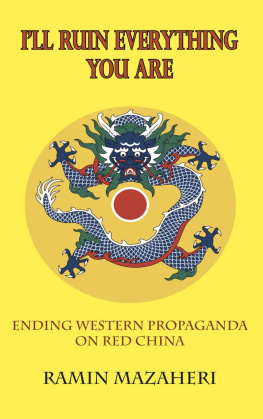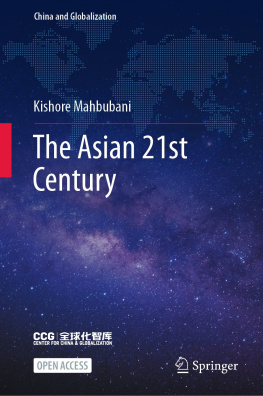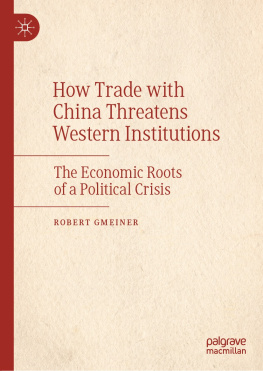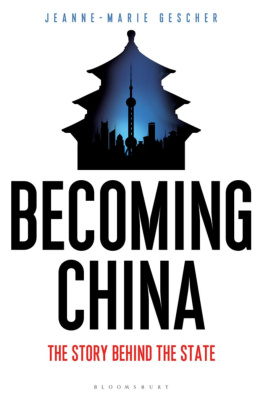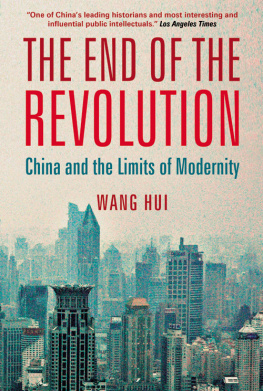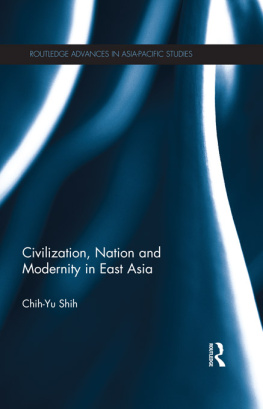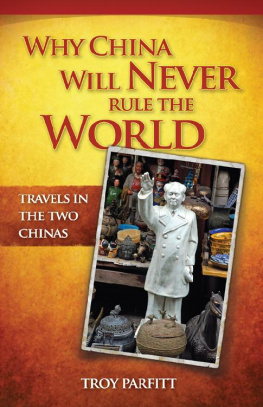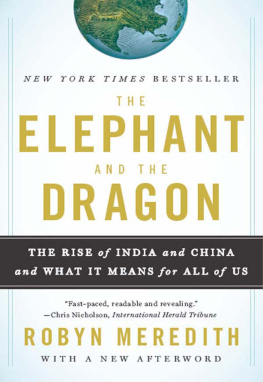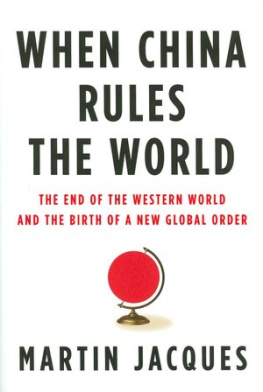
Martin Jacques
When China Rules the World
***

For Hari
My love for you knew no limits, nor has it dimmed with time.
I miss you more than words can ever say.
My interest in East Asia dates back to a visit to the region in 1993 when I also happened to meet my wife to be, Harinder Veriah, on Tioman Island, Malaysia. The idea for this book dates back to 1996. In 1997-8 contracts were signed and plans drawn up for us to be based in Hong Kong for three years. At the beginning of November 1998 we arrived in Hong Kong with our nine-week-old son, Ravi. Just fourteen months later, Hari died in the most tragic circumstances. It was five years before I could resume work on the book. I would like to thank everyone who, in their different ways, gave support and helped me survive the darkest days anyone could possibly imagine, especially Marlene Hobsbawm, Karena Ghaus, Ian Selvan, Rabindra Singh, Jasvinder Kaur, Graham Huntley, Joe Collier, Stuart Hall, Antonio Borraccino, Selvi Sandrasegaram, Paul Webster, Dhiren Norendra, Bob Tyrrell, Frances Swaine, Douglas Hague and Shariza Noordin.
I am very grateful to Eric Hobsbawm (a very close friend for over thirty years), Niall Ferguson (who first planted the idea in my mind that I should write this book), Christopher Hughes and Arne Westad for reading the manuscript and making many valuable suggestions as to how it might be improved and hopefully at least saving me from the worst of my mistakes and indiscretions. Chen Kuan-Hsing read Chapter 8 and has discussed many of the ideas in it with me over the last few years. I, of course, remain solely responsible for the book as it now appears, warts and all.
I would like to express my gratitude to Tony Giddens, former director of the London School of Economics, and Meghnad Desai, then chairman of the Asia Research Centre, who arranged for me to become a visiting research fellow at the Centre in 2004, a connection which has continued to this day. I am also now a senior visiting fellow at the LSEs IDEAS, an association for which I would like to thank Michael Cox and Odd Arne Westad. I was a visiting professor at the International Centre for Chinese Studies, Aichi University, Nagoya, for four months in early 2005, where I received splendid hospi-tality from Professor Mitsuyuki Kagami and Professor Kazumi Yamamoto, who I would like to thank most warmly. For three separate periods in 2005-6 I was a visiting professor at Renmin University, which I enjoyed immensely; in particular I would like to thank my generous host, Professor Song Xinning. In autumn 2005 I was invited by Professor Nishi to be a visiting professor at Ritsumeikan University, Kyoto, which proved rewarding. I spent four months at the beginning of 2006 as a senior research fellow at the Asia Research Institute, National University of Singapore, for which I would like to thank the then Director Professor Anthony Reid. These visits assisted me enormously in both my research and writing.
The Barry Amiel and Norman Melburn Trust gave me generous financial assistance to enable me to carry out my research. Having had the privilege of knowing both while they were still alive, I hope they would think their money has been put to good purpose. I am grateful to the trustees for their support.
During the course of 1999, before my wife died, I spent almost a month in each of Shanghai, Tokyo and Taipei. I am very grateful to the following for sparing me the time to share their ideas with me: Dai Badi, Tong Shijun, Gu Xiao-ming, Xie Xia-ling, Melvin Chu, Jiao Chun-xue, Ma Lian-yuan, Wang Xiaoming, Wu Jiang, Yang Qingqing, Christopher Tibbs, Lu Hao, Ge Jianxiong, Zhou Jun, Shen Kai, Graham Earnshaw, Sun Xiaolong, Cao Jingyuan, Chen Xiaoming, Teng Xuekun, Yu Zhiyuan, Yu Ming, Qiao Yiyi, Zhang Xiaoming, Wang Jianxiong, Huang Yongyi, James Harding, Ma Chengyuan, Shen Guanbao, Gao Rui-qian, Frank Gao, Hsu Feng, Qui Genxiang, Kevin Tan, Ji Guoxing, Xu Jilin, Bao Mingxin, Qiao Yiyi, Lu Yongyi (Shanghai); Chen Kuan-Hsing, Sechin Yung-xiang Chien, Chu-Joe Hsia, Liang Lu, Ling Mei, Hsu Hsin-liang, Hung Tze Jan, Stan Lai, Johnny Tuan, Bing C. P. Chu, Sen Hong Yang, Sheena Hsu, Wei-Chung Wang, Ti-Nan Chi, Ku Chung-Hwa, Yun-Peng Chu, Wan-Wen Chu, Chihyu Shih, Andrew Nien-Dzu Yang, Ping Lu, Jian-San Feng, Edward Wong, Szu-Yin Ho, Chen-Kuo Hsu, Chunto Tso, Chieh-Fu Chen, Chiang Sung, Hsiung-Ping Chiao, Christopher R. Fay, Benny T. Hu, Allen Chun, Antonio Chang, W. S. Lin, Darlene Lee (Taipei); Chie Nakane, Kiyoshi Kojima, Kosaku Yoshino, Kiyohiko Fukushima, Tatsuro Hanada, Shunya Yoshimi, Noriko Hamo, Yukiko Kuroda, Mitsutoshi Kato, Odaka Naoko, Tadashi Nakamae, Peter Tasker, Martin Reeves, Takashi Kiuchi, Yoichi Funabashi, Kiichi Fujiwara, Shinji Fukukawa, Toshiya Uedo, Sahoko Kaji, Takashi Yamashita, Kang Sangjung, Yoshiji Fujita, Masa moto Yashiro, Sadaaki Numata, Richard Jerram, Valerie Koehn, Mark Dytham, Astrid Klein, Tetsuo Kanno, Tadashi Yamamoto (Tokyo).
I am grateful to Kenneth Yeang, Zeti Akhtar Aziz, Mohamed Arif Nun, Jomo Kwame Sundaran, Shad Saleem Faruqi, Francis Yeoh Sock Ping and many others for interviews in Kuala Lumpur. In particular, I owe a large debt of gratitude to the late Noordin Sopiee, who always found time to chew the fat during my frequent visits. Although Hong Kong was more a base than a place for field research, I would like to mention Frank Ching, John Gittings, Oscar Ho, Andy Xie, Christine Loh, Lian Yi-Zheng and K. Y. Tang, again amongst many others, who gave of their time. During a visit to San Francisco I gained a better insight into the Chinese community there, especially through my conversations with L. Ling-Chi Wang and Albert Cheng. I interviewed Xin Hu, Miles Lee, Zhang Jiansen and Charlie Zheng in Shenzhen. I would particularly like to thank Wang Gungwu, Geoff Wade, Kishore Mahbubani, Chua Beng Huat and Anthony Reid for spending time with me during my stay in Singapore. Professor Mitsuyuki Kagami and Professor Kazumi Yamamoto never failed to find time for our many conversations during my stay at Aichi University, while Chunli Lee shared with me the fruits of his studies on the Chinese automobile industry and Uradyn E. Bulag discussed China s relationship with Mongolia. I also learnt a great deal from my Chinese doctoral students whom I had the privilege of teaching whilst I was there. I would like to thank my friend Chen Kuan-Hsing for providing me with constant advice and assistance during my various stays in East Asia, especially Taiwan, Japan and Singapore.
My stay in Beijing in 2005-6 was the source of much enlightenment. I whiled away the time in many fascinating conversations. I would particularly like to thank Song Xinning, Jin Canrong, Zhu Feng, Fang Ning, Zhang Yunling, Wang Yizhou, Zhu Wenhui, Wang Yuqing, Feng Zhongping, Wang Zhengyi, Pan Wei, Wang Hui, Wang Xiaodong, He Zengke, Kang Xiaoguang, He Guangbei, Ye Zicheng, Yu Zengke, Zha Daojiong, Cheng Lu, Liu Xiu and Liu Hua. My greatest debt of all is to Yu Yongding, Huang Ping and especially Shi Yinhong, who have been unfailingly helpful and hugely stimulating in the many conversations I have enjoyed with them.
Zhang Feng has assisted me with great thoroughness and efficiency on the footnotes and bibliography, as well as doing some background research on Chapter 11. Sherlyn Wong has conscientiously sought to obtain the necessary permissions.
I am very fortunate in having a fine agent in Andrew Wylie, to whom I owe a debt of gratitude. I would also like to thank my previous agent Georgina Capel, who helped to initiate the project.
Next page

